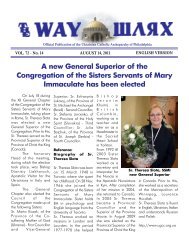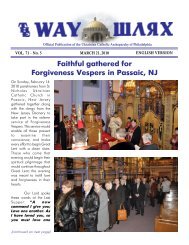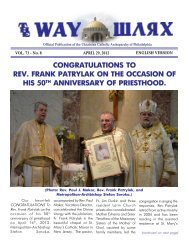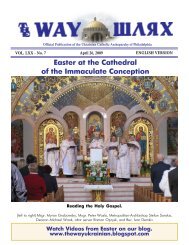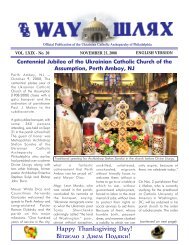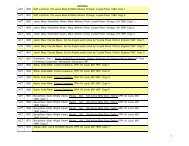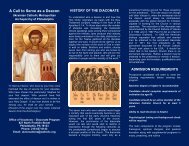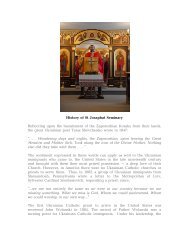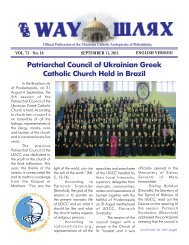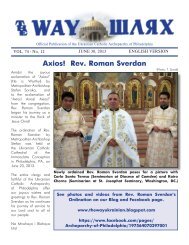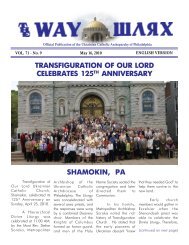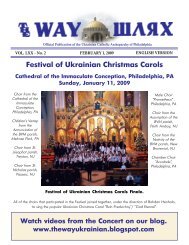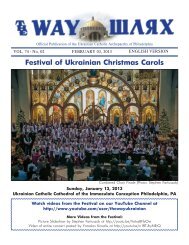The Way - Ukrainian Catholic Archeparchy of Philadelphia
The Way - Ukrainian Catholic Archeparchy of Philadelphia
The Way - Ukrainian Catholic Archeparchy of Philadelphia
Create successful ePaper yourself
Turn your PDF publications into a flip-book with our unique Google optimized e-Paper software.
<strong>The</strong> Great Lent<br />
Lent is a season <strong>of</strong> soul-searching and repentance. It is a season for<br />
reflection and taking stock. Lent originated in the very earliest days <strong>of</strong> the<br />
Church as a preparatory time for Easter, when the faithful rededicated<br />
themselves and when converts were instructed in the faith and prepared for<br />
baptism. By observing the forty days <strong>of</strong> Lent, the individual Christian imitates<br />
Jesus’ withdrawal into the wilderness for forty days. All churches that have<br />
a continuous history extending before AD 1500 observe Lent. <strong>The</strong> ancient<br />
church that wrote, collected, canonized, and propagated the New Testament<br />
also observed Lent, believing it to be a commandment from the apostles.<br />
(See <strong>The</strong> Apostolic Constitutions, Book V, Section III.)<br />
Because Sunday is the day <strong>of</strong> the Resurrection, we skip over Sundays when<br />
we calculate the length <strong>of</strong> Lent. <strong>The</strong>refore, in the Western Church, Lent<br />
always begins on Ash Wednesday, the seventh Wednesday before Easter.<br />
In many countries, the last day before Lent (called Mardi Gras, Shrove Tuesday, Carnival, or Fasching) has<br />
become a last fling before the solemnity <strong>of</strong> Lent. For centuries, it was customary to fast by abstaining from<br />
meat during Lent, which is why some people call the festival Carnival, which is Latin for farewell to meat.<br />
<strong>The</strong> Eastern Church does not skip over Sundays when calculating the length <strong>of</strong> the Great Lent. <strong>The</strong>refore,<br />
the Great Lent always begins on Clean Monday, the seventh Monday before Easter, and ends on the<br />
Friday before Palm Sunday—using <strong>of</strong> course the eastern date for Easter. <strong>The</strong> Lenten fast is relaxed on the<br />
weekends in honor <strong>of</strong> the Sabbath (Saturday) and the Resurrection (Sunday). <strong>The</strong> Great Lent is followed by<br />
Lazarus Saturday and Palm Sunday, which are feast days, then the Lenten fast resumes on Monday <strong>of</strong> Holy<br />
Week. Technically, in the Eastern Church, Holy Week is a separate season from the Great Lent.<br />
But the Word “Lent” isn’t in the Bible! <strong>The</strong> word “Bible” isn’t in the Bible, either! So what we’re really asking<br />
is the origin <strong>of</strong> the name.<br />
Originally, “Lent” was nothing more than the English name <strong>of</strong> the season between winter and summer, the<br />
season when the snow melts and the flowers bloom. German and Dutch have the same word, but with<br />
slightly different spelling. In German, “Lenz” means “spring” in poetry. In Dutch, the word “lente” never<br />
changed its meaning. It is still the name <strong>of</strong> the season between winter and summer, and it is still used in<br />
everyday life.<br />
<strong>The</strong> church observance took place during the season <strong>of</strong> lent. In<br />
England, “Lent” came to mean the observance rather than the<br />
season, leaving the season without a name. Instead <strong>of</strong> saying<br />
stupid things like “Lent happens during lent,” English-speaking people<br />
invented the word “spring.” Today, instead <strong>of</strong> calling the seasons<br />
winter, lent, and summer, we call them winter, spring, and summer.<br />
We use “Lent” instead <strong>of</strong> “spring” when we refer to the church<br />
season. (http://www.kencollins.com)<br />
February 19, 2012<br />
3



